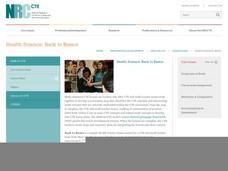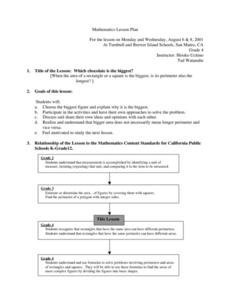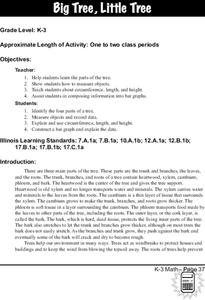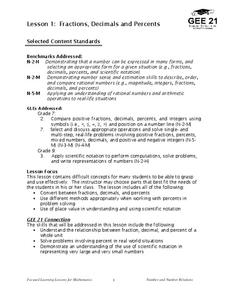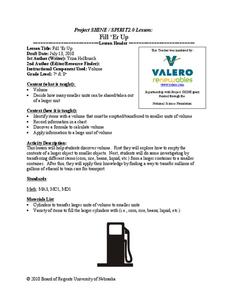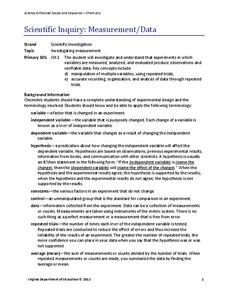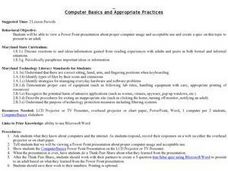Curated OER
Converting American Units of Length
In this math worksheet, students convert American standard units of length measurement in 30 problems. Included are conversions to inches, feet, yards and miles. There are no hints or examples on the page.
Curated OER
Length and Volume Exploration
Students explore how to measure length and volume. They compare and order objects according to their measurable attributes and measure items using non-standard units. Students put 4 pencils in order from shortest to longest after...
Curated OER
Length, Perimeter, and Area
Pupils explore the concepts of length, perimeter, and area. In this math lesson, students use Shape Explorer to practice finding length, perimeter, and area.
Curated OER
Height and Weight
Third graders explore their height and weight. They measure the heights and weights of their peers. Students record their data using an Excel spreadsheet. They create a graph to compare the data and analyze it for a correlation between...
Curated OER
Dinosaurs and Classification
Second graders explore dinosaurs and identify them by their size. They compare the dinosaurs with objects around the school or on the playground. Students predict which dinosaurs are the largest and then measure the length of dinosaurs.
Curated OER
Estimation Task
Upper graders practice their estimation skills by observing different objects then making their best guess without using measuring instruments. Students are asked to estimate mass, length, volume, and area.
Curated OER
Garden Scavenger Hunt
Second graders examine the metric system. In this metric system lesson, 2nd graders compare measurements of common objects in metric units. Students compete in a garden scavenger hunt.
Curated OER
Measurement
Pupils create two prisms out of the same paper. They calcuate the number of centimeter cubes needed to fill each prism. They discover the concept of volume.
Curated OER
Recipe Conversions-Enrichment Worksheet
A recipe for Chocolate Chewies, a no-bake cookie, is provided, but the ingredients are not written in useable amounts. Your cooking class must first convert them into useable amounts before preparing the treat. The final product acts as...
Curated OER
Shoe Showdown
Third graders use rulers to measure their shoe size in inches and centimeters. They then enter the class shoe measurements into an excel data base and graph the results of both to make the comparison.
National Research Center for Career and Technical Education
Health Science: Back to Basics
This lesson focuses on unit conversion, proportions, ratios, exponents, and the metric system. Discuss measurement with your math class and demonstrate how to solve several health-science word problems. Give learners a chance to visit an...
Curated OER
Which Chocolate Is The Biggest?
Students investigate the concepts of area and perimeter with the use of chocolate bars. They calculate the perimeter and area of different size rectangle chocolate bars and record the statistics. Then students make a visual comparison...
Curated OER
Trees
Learners investigate the parts of a tree, measure its circumference and the length and width of its longest branch. The data is compiled and placed into a bar graph.
Curated OER
Fractions, Decimals and Percents
Students investigate the differences when using decimals, fractions, and percents. They focus on the process of using them in real problems and how to convert them from one form to another.
Curated OER
Fill 'Er Up
Students identify how many smaller units can be found in a later unit. In this geometry lesson, students calculate the volume and the transfer amount to a smaller unit. They solve real life problems using the formula for volume.
Virginia Department of Education
Scientific Inquiry: Measurement/Data
While pupils design their own lab experiments, they will not form a new species. Scholars take their materials and design an experiment regarding reaction rates.
Teach Engineering
Capillarity – Measuring Surface Tension
How do cohesion and adhesion work together? The third installment of a nine-part series teaches young scientists the difference between adhesion and cohesion. They also learn how cohesion and adhesion work together to cause capillary...
Curated OER
Matchstick Math: Using Manipulatives to Model Linear, Quadratic, and Exponential Functions
Playing with matches (unlit, of course) becomes an engaging learning experience in this fun instructional unit. Teach pupils how to apply properties of exponential functions to solve problems. They differentiate between quadratic and...
Kenan Fellows
Using Water Chemistry as an Indicator of Stream Health
Will this water source support life? Small groups test the chemistry of the water drawn from two different sources. They then compare the collected data to acceptable levels to draw conclusions about the health of the source. The...
Curated OER
The Power of Graphical Display: How to Use Graphs to Justify a Position, Prove a Point, or Mislead the Viewer
Analyze different types of graphs with learners. They conduct a survey and determine the mean, median and mode. They then identify different techniques for collecting data.
NASA
Measuring Dark Energy
You're only 10 minutes late? Do you know how much the universe has expanded in those 10 minutes? Scholars graph supernovae based on their redshift and see if the results verify Hubble's Law. If it does confirm it, the universe is...
Curated OER
Understanding Dialect as Used by Mark Twain
A reading of Mark Twain’s The Celebrated Jumping Frog of Calaveras County not only offers pupils an opportunity to practice their listening skills but also provides them with examples of dialectic speech. This is the gol’derndest lesson...
Curated OER
Computer Basics and Appropriate Use
View this PowerPoint and go over the basic rules about computers. It is well-suited for all ages because the rules apply to all learners. Everyone benefits from knowing the terms for working with computers. But more importantly, make...
Curated OER
Va Va Va Zoooommm
Students, in groups, measure a variety of physical components to several activities. They use both standard and non-standard forms of measurement and then develop conclusions about the use of units in measurement.










